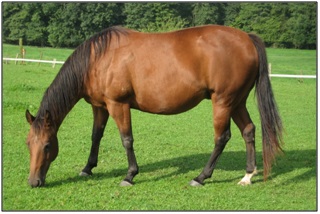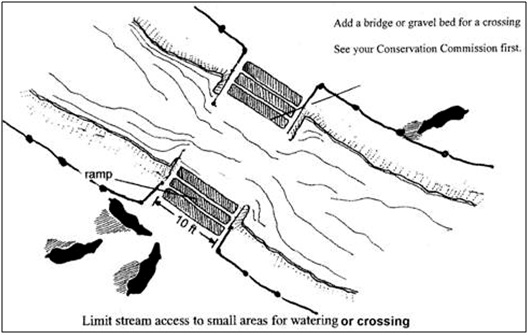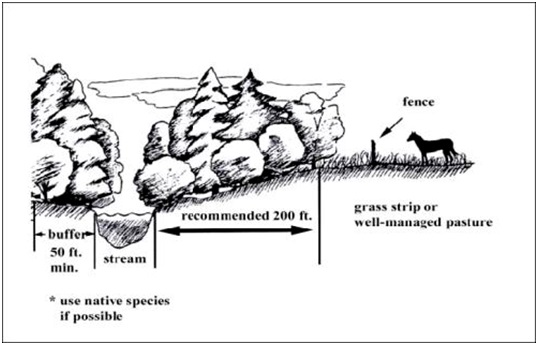Horsekeeping:
Manure Impacts on Surface Water Quality

The quality of water directly impacts the quality of our lives. Contaminated water eliminates drinking water supplies for our horses and families, degrades our recreational water resources, and destroys wildlife habitat. Water that does not soak into the ground, whether from rain, snowmelt, a hose, or leaking pipes, is called runoff. Runoff picks up contaminants, such as nutrients, pathogens, and bacteria from manure and can transport them to the nearest water resource (lake, pond, wetland, stream, or river). Certain site conditions, such as steep and unprotected slopes, lack of vegetative cover, and proximity to receiving waters will encourage manure and contaminants associated with manure from entering surface water resources. Pollution carried by runoff is called nonpoint source pollution (NPS). Proper manure management and runoff management will protect or improve water quality on your property, and in your community and watershed.
Manure contains nutrients, such as phosphorus and nitrogen, and pathogens, including bacteria, viruses and parasites. These pollutants contaminate water resources and reduce recreational potential of lakes and rivers, destroy wildlife habitat, and eliminate drinking water supplies for people and livestock.
How does manure impact water resources?
When manure is deposited in water resources, either directly or by runoff, it can negatively impact water resources. The nutrients contained in manure, phosphorus and nitrogen, can be carried by runoff to the nearest water body, such as a pond, stream or lake. The nutrients then fertilize aquatic weeds and accelerate weed growth in lakes and ponds. The aquatic plants deplete oxygen levels, reducing the amount of oxygen available for other aquatic species such as fish. When the weeds die, additional oxygen is required for decomposition, further stressing oxygen stores and aquatic life. Direct manure entry into the water resource can also cause oxygen starvation due to increased biological oxygen demand (BOD), and result in fish kills. Algae blooms are another result of excess nutrients in the lake or pond. Algae blooms further reduce oxygen in the water body, can turn the water an unsightly murky green, and generate an unpleasant odor. Eutrophication (accelerated weed growth) and algae blooms kill fish and make swimming and boating unpleasant.
When the pathogens found in manure, including viruses, parasites, and bacteria such as fecal coliform and e. coli, are deposited into a stream or lake, swimming areas and shellfish beds may be closed. Pet and livestock drinking water supplies may be contaminated.
What Can I Do to Protect Water Quality?
Prevent manure from being directly deposited in water resources. Keep horses out of streams, lakes, ponds and wetlands. If you can not completely fence your horse out of these areas, build water crossings to limit access as much as possible. (Note: Before installing anything in a waterbody you must contact your Conservation Commission.) Consider alternative water sources, such as troughs or an automatic watering system.
 Establish a vegetated buffer strip
Establish a vegetated buffer strip between horses and any water resources. Don't be discouraged if you have a small area to work with. Any buffer strip is better than none at all!
 Manage your horse's manure.
Manage your horse's manure. Proper manure management consists of containing manure, treating manure, and disposing of manure.
Contain: Pick up manure from stalls, paddocks and pastures on a daily or regular basis.
Treat: Composting manure is an effective way to transform waste into a valuable resource for your pastures and gardens. Maintaining a temperature of 135 degrees to 160 degrees will kill most pathogens, parasites and weed seeds. This means fewer flies on your property, reduced odors, and a reduced possibility of parasite infestation for your horse. Refer to the Composting fact sheet for more information.
Dispose: Composted manure is a valuable resource that can enhance the soil and fertilize your pastures and gardens. If you can rotate your pastures, composted manure can be spread in resting pastures during the growing season at no more than a half-inch layer at a time. If manure is not composted, and you plan to spread it daily or routinely, spread manure on fields that will not be used for grazing, probably for at least a year. Composted manure can also be shared with horseless neighbors!
Minimize runoff. Encourage stormwater infiltration on your property to reduce runoff, and thus the transport of nutrients and pathogens to water resources. Small grassed depressions in your pasture can act as detention basins, capturing water, encouraging sediment and nutrients to filter out of the water, and encouraging infiltration. Roof gutters can direct rain and snowmelt to drywells or rain barrels. Divert storm runoff from high traffic areas and paddocks by constructing grassed swales or diversions.
Additional Resources
http://www.extension.umn.edu/distribution/naturalresources/DD7540.html
"Manure and Pasture Management for Recreational Horse Owners", a series of web sites by the University of Minnesota Extension Service. Includes plans for building a composting bin, detailed discussion of the composting process, information on pasture management, and an extensive list of additional sources of information.
http://extension.unh.edu/resources/representation/Resource000002_Rep2.pdf
This link takes you to the online version of the Good Neighbor Guide for Horse-Keeping: Manure Management, an excellent publication developed by the University of New Hampshire Cooperative Extension Service, New Hampshire Department of Environmental Services, and Natural Resources Conservation Service.
Agency Resources
Massachusetts Department of Environmental Protection (MassDEP), Nonpoint Source Coordinator (technical assistance and outreach): Jane Peirce, 508-767-2792 or
jane.peirce@state.ma.us.
Massachusetts Department of Food and Agriculture:
Agricultural Environmental Enhancement Program (AEEP)
USDA Natural Resources Conservation Service
The Natural Resources Conservation Service is a Federal agency that works in partnership with the American people to conserve and sustain our natural resources.
Natural Resource Conservation Service Centers:
- Berkshire CD: 413-443-6867
- Hampden-Hampshire CD: 413-586-5440
- Essex-Middlesex-Suffolk CD: 978-692-1904
- N.E.N.W., S. Worcester CD: 508-829-6628
- Bristol-Plymouth-Norfolk CD: 508-295-5151
- Cape Cod-Nantucket-Dukes CD: 508-771-6476
- UMass Cooperative Extension Service: 413-545-4800